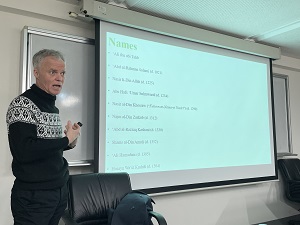Report
On January 20, 2024, the Tobunken Seminar “Denominational Dynamics within Futuwwat Literature of the Medieval Period in Anatolia and Iran” was held at the Institute for Advanced Studies on Asia, featuring Dr. Lloyd Ridgeon from the University of Glasgow as the lecturer. Dr. Ridgeon elucidated, through a diachronic survey of futuwwat works written in Persian from the 12th to the 16th century, how it was inappropriate to link the ʿAlidization clearly observable in the futuwwa tradition during the period to any form of Shiʿitization. Approximately 15 participants attended the seminar in person or online. After the presentation, a lively question and answer session took place.
Event Details:
Date: January 20, 2024 (Saturday) 16:30–18:10
Venue: First Conference Room, Institute for Advanced Studies on Asia, University of Tokyo/Zoom
Speaker: Dr. Lloyd Ridgeon (University of Glasgow)
Title: Denominational Dynamics within Futuwwat Literature of the Medieval Period in Anatolia and Iran
Moderator: Kazuo Morimoto (Oriental Culture Research Institute)
Abstract: By the medieval period, the futuwwat associations had evolved into a form of “second-class” Sufism. While the authors of most futuwwat treatises during this period belonged to a Sunni madhhab, their works showed no overt hostility to the Shiʿa tradition. What stood out was the promotion of a form of ʿAlidisation. This might be explained by similarities in Sufi-Shiʿi dogma and the presence of influential Shiʿi individuals around political leaders. This presentation examines eight individuals/futuwwat-nāmas to explore whether there was tension between these two denominations in Islamic society.

